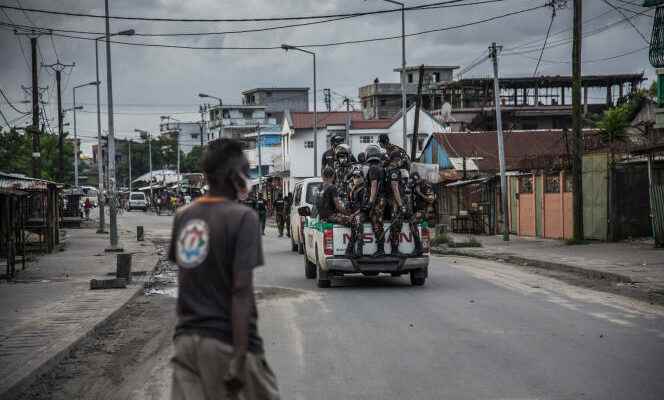Insecurity is worsening in Madagascar and the population is tempted to respond to it with popular vindictiveness to compensate for the absence or powerlessness of the police. Friday, September 2, Patrick Agopian, a 67-year-old Frenchman, owner of a farm in the Morondava region (west of the country) was shot in the head. The man was the target of a band of zebu thieves, the dahalo, as was one of the villagers who was trying to defend him. The thugs stole 150 head of cattle.
The death of another Frenchman, Bernard Robert, a retired electrician and engaged in mutual aid actions with the Catholic mission of Ambositra, a town in the highlands, was confirmed by the local press on Saturday. He succumbed to the attack of criminals who had entered his home.
These two deaths feed the daily chronicle of thefts and murders in Madagascar. A criminality which took a particularly tragic turn barely a week ago in the district of Ikongo, a landlocked area in the south-east of the island, on the side of a slope between the high plateaus and the coastal plain of Indian Ocean. The kidnapping of an albino child, then the execution of his mother who tried to intervene, caused immense emotion among the inhabitants and a demonstration of several hundred people ended in a bloodbath.
general
Self-defense or blunder? The circumstances in which the gendarmes fired on the angry crowd on Monday August 30, killing 19 and injuring twenty, remain unclear. Armed with sticks and some with knives, according to the police, the villagers demanded that four detainees suspected of being the perpetrators of the abuses be delivered to them. On the scene of the tragedy the next day to offer his condolences to the population, the Prime Minister, Christian Ntsay, announced the opening of an investigation.
But for the deputy of the district, Jean Brunelle Razafintsiandraofa, the slippage of the soldiers is not in doubt. “The gendarmes fired without hesitation after their commander received the order. This was given by telephone and witnesses could hear it because the device was in loudspeaker mode. No real negotiation was attempted with the demonstrators who were still far from the gendarmerie barracks where the suspects were imprisoned when the shots were fired”, affirms this elected representative of the majority and vice-president of the National Assembly who calls for a parliamentary inquiry. He also addressed a letter to the local representatives of the United Nations, the European Union and the United States “so that they ensure that the case is not covered up”.
After using tear gas and warning shots to try to disperse the crowd, the police explained that they had no choice but to “use self-defence” to guarantee their safety and that of the suspects who in the confusion nevertheless managed to escape. In the general scramble that then seized the city officials for fear of reprisals, nearly two hundred prisoners fled from the penitentiary. Two women belonging to the families of the suspects were lynched.
Discredit of the judicial system
The Ikongo massacre brutally brought to the fore the reality of isolated rural areas plagued by growing insecurity as a result of the economic crisis in which Madagascar sank with the Covid-19 pandemic. Ikongo also suffered particularly from the passage of the powerful cyclone Batsiraï in February. “For several months, thefts and murders have multiplied without the police intervening. The villagers live on permanent alert and are exhausted” argues Jean Brunelle Razafintsiandraofa.
The inability of the State to ensure security over entire portions of the territory and the discredit of a judicial system undermined by corruption encourage this popular vindictiveness which, far from being a new phenomenon, finds in this deleterious context a new purpose. “The newspapers are full of atrocious news stories that give the vision of a mass grave. The army does not have the human or material means to carry out its missions and no one has confidence in a justice system where money can buy the verdict of a trial.notes a retired general who requests anonymity.
Fear haunts the countryside. The worst crimes occur there in an atmosphere where horror and banality end up mixing. At the end of July, in a village located 75 km north of the capital Antananarivo, 32 people, including fifteen children, died burned alive or asphyxiated in their house set on fire by dahalo. Like Ikongo, people with albinism know they are increasingly targeted.
“Stealing Children”
At the beginning of the year, following a field mission, three independent experts from the United Nations Human Rights Council alerted the government to the extent of the phenomenon and called for urgent protective measures. Assaults and kidnappings “have been particularly observed in regions affected by chronic insecurity linked to dahalo who are said to have resorted to ritual practices including the killing of people with albinism for the use of their body parts” , they write. These organs and in particular the eyes are, according to certain beliefs, supposed to protect from bullets, to allow seeing in the dark, to attract luck and wealth, or to ward off bad luck.
The expert report lists kidnappings since February 2020 in the south of the country with several cases of beheading. It is not excluded that these persecutions also serve an international traffic towards countries where these practices are anchored for a long time as in East Africa. “We are dealing with organized networks with proven methods. The use of false identity papers makes it possible, for example, to steal children without the parents who do not have any civil status document being able to oppose it”, explains Mbolatiana Raveloarimisa, founder of the Movement for Difference. She deplores the inertia of the public authorities, leaving the families alone in the face of the permanent risk of kidnapping.
